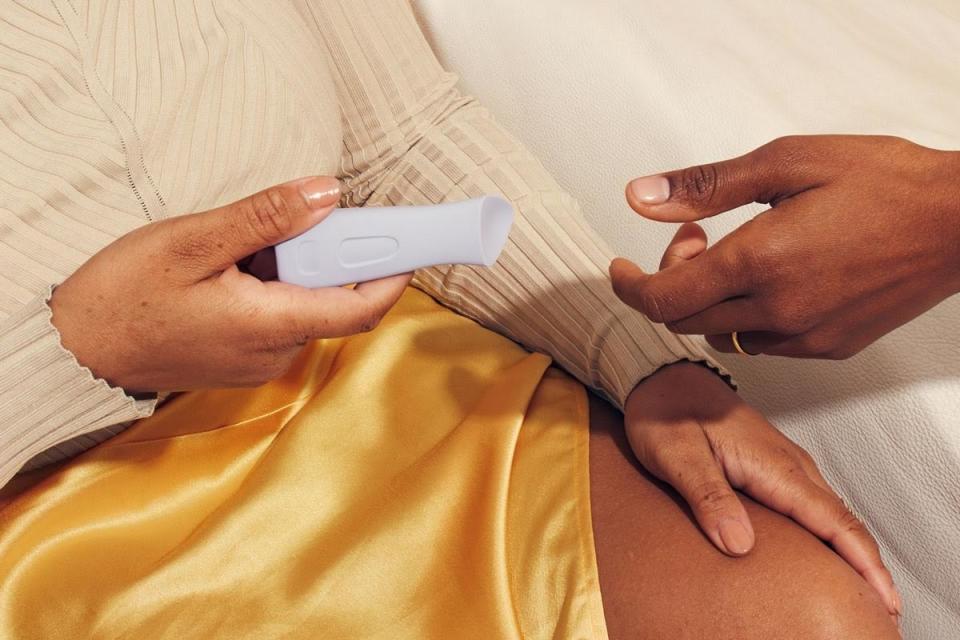Could Your Instagram Side Hustle Be Worth $100,000?
You've heard ballet dancers talk about their first class or actors talk about their middle school musicals. That first chance to tap into a fixation they didn't even know they had. Or as Alex Fine, cofounder and CEO of Dame Products, puts it: "I think some people are born in the world and see a paintbrush…and that’s it—they are a painter. For me, it was my clitoris." (Dame's most well-known product is the Eva, the first hands-free, strap-free, nonintrusive vibrator.) Like generations of artists who preceded her, before Fine was a sex tech entrepreneur, she was just a woman with a unique obsession.
With the rise of the side hustle, more and more women have followed Fine’s lead in the hopes that their skills and hobbies can become their full-time gigs. But where to start? We spoke to women who built their company’s cult following on Instagram, raised the money they needed to launch business on Indiegogo, and found their customers in the DMs. Read on for their tips on how to turn your passion project into a paid gig.

If you're going to crowd-fund, you need to reach a third of your goal in the first 24 hours.
Alex Fine grew up infatuated with sex. In first grade she was known as the "class seductress." In high school she read every book about sexuality she could get her hands on. In college she studied to become a sex therapist and worked at Planned Parenthood, ran her campus' Sexual Awareness Week, and had a late-night sex-focused talk radio show.
After graduation, Fine worked at a start-up selling baby shampoo. But at night she made handmade vibrators for her friends and fiddled with a prototype for hands-free, couples vibrator. When Fine met her future Dame Products cofounder, Janet Lieberman, they decided to turn Fine's prototypes into a mass-producible product—and bring it to market.
But to create their product they needed capital. "We didn't want to go the venture capital route," says Fine. "I don’t want to group all VC's together, but they are predominantly older white men. So trying to sell them the concept of our company—which is about women’s pleasure—is challenging since it’s harder for them to get the need for it." Instead, Fine and Lieberman launched an Indiegogo campaign in 2014 to raise the money for their first vibrator, Eva. "On the first day you launch an Indiegogo campaign, you want to make a third of your goal money, because the algorithm for Indiegogo is really strong, so if you're growing and raising a lot of money, you'll get a lot more eyes on your campaign. So before we launched, I wrote to every contact I'd ever emailed. I would send 450 emails a day letting people know that I’d started this company and asking them to contribute or share it with their friends," says Fine. It worked. Their campaign had a goal of $50,000 and they ended up raising $575,000—making them the most successful sex toy campaign ever. Since, they've launched five other vibrators (Kip, Pillo, Pom, Eva II, and Fin), and have grossed over $2 million.
Mark your intellectual property and maximize eyeballs on your product.
It all started with Jamie Foxx and Barbra Streisand. It was 2017, and Instagram had just changed its algorithm so that users could see comments from verified accounts on a post. Friends Emma Diamond and Julie Kramer had shared screenshots of different celebrity comments in their group chat for ages—mostly exchanges between Kourtney Kardashian and Scott Disick, of course. But Foxx and Streisand gave them their eureka moment. "He would comment on Barbra Streisand's pictures things like, 'You're the most beautiful woman in the world.' And we were like, 'Who knew that they had this dynamic?' We realized we were unearthing something the general public wasn't aware of—and we had to do something with it," says Diamond.
Thus Comments by Celebs was born. The account quickly amassed an audience of 80,000—but it wasn't until they implemented a small feature on their posts that they saw exponential growth. "In early 2018 we added a watermark to all of our posts. It's been really important to us because yes, our content is humorous, but it’s also become a leading source of entertainment news," says Diamond. "So if you know that a publication is going to embed a post in their story, or a celebrity will share it on their story, it definitely pays to have that watermark on it to drive traffic back to our account. We also made sure the watermark looked clean on the page; we wanted it to be as undisruptive to the content as possible—while still clearly marking our intellectual property."
In a landscape where it's so easy to steal a meme and pass it off as your own, marking their territory was a game changer. In the year after they introduced the watermark, Comments by Celebs reached more than one million followers. From there came sponsored-content opportunities—the first was none other than Budweiser. Now Diamond and Kramer are focused on developing their recently launched podcast, on which they've interviewed Instagram royalty like Lisa Rinna and Gary Janetti.

Reinvest in your business. And never ignore a DM.
Kim Kardashian West. Hilary Duff. 2 Chainz. What do all of these icons have in common? They've feasted on Flour Shop's $150 explosion cake. But before the rainbow sprinkle confection was one of the most ’grammed treats in the world, baker Amirah Kassem grew up making them with her mother in Chihuahua, Mexico. When Kassem left home to go to fashion school in the United States, she brought the recipe for her mother's explosion cake with her.
But even as her career in fashion took off, she realized she was the happiest in front of a stove. "My friends were constantly asking me to make them my mom's cake, so I'd carve out time before work in the morning to work on them," says Kassem. "Then I realized, If my favorite time of day is when I'm in the kitchen, maybe I should make this my job. I just thought, If I could play with sprinkles as a career, that would be the best life ever." Shortly after, Kassem made a leap of faith. She quit her job and focused all of her attention on her former side hustle, baking cakes and building an Instagram account dedicated to them. Without much for savings, Kassem had to find alternative revenue streams to support herself while creating Flour Shop—like renting out the living room in her one bedroom apartment. But Kassem maintains, "There never would have been an amount in the bank that would make me feel secure in quitting my job, because at the end of the day you don't know if your idea is going to work—it's all about being willing to put in the sacrifices to try your hardest."
At first, Kassem charged customers 75 percent more than the cake's current price of $150. The reason? The sheer amount of manpower it took her to create the six-layer cake on her own. But Kassem was very strategic with how to spend her profits. Instead of building a website or investing in a storefront, "I would buy a pan or an attachment to my mixer. Imagine trying to make a six layer cake with one pan! I ended up buying equipment like this for years, cake by cake," she says. And with each pan—or employee she was able to hire—the cakes became easier to make, and the price continued to drop.
Another driving factor in Flour Shop's success is its unbeatable social presence. Ever since launching its Instagram, Kassem has followed one simple rule: Don't ignore a post, comment, or DM—because you never know what business that could lead to. "When I first launched Flour Shop, a lot of my initial orders came over DM, from people who saw the cakes and wanted one for themselves. It was really helpful to see firsthand who the customer was, who was interested in our product, and to get to know our audience," she says. They were also able to take these customer insights and better grow their brand to help suit their interests and needs.
Now that Flour Shop is one of the most popular bakeries in the world and their cakes are bona fide "Insta goals," Kassem and her team remain just as focused on audience engagement. "We still respond to every single thing that anyone ever writes to us, and try to comment on all of the posts we're tagged in. I think that’s really important that our customers are being heard even when they just DM us, 'We love your cakes.' Plus, it makes our day too," she says. Because in a world of bad Yelp reviews, and angry tweets, there's nothing more valuable than keeping your customers happy—and coming back.
April is Financial Literacy Month on CNBC. To mark it we don't just want to talk about the wage gap or the disadvantages women still face in the workplace. We want action—to the tune of $10,000. This month we'll explore what women can do to net a cool $10K. That means strategies to save more and spend smarter, tactics to negotiate not just at work but on health care, home decor, and more, and stories to inspire your inner CEO.

